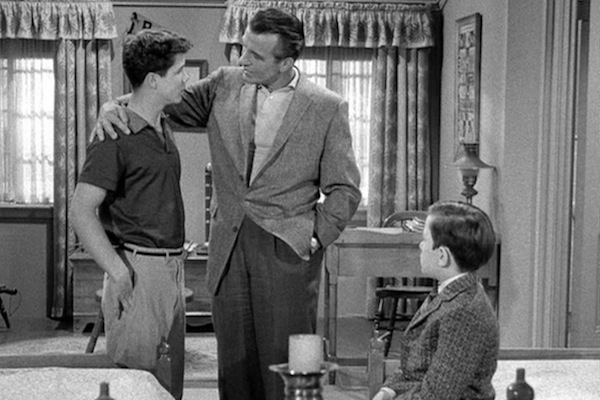Study suggests some fathers elevate their games

A UW–Madison study says fathers can improve as parents based on perceptions of how they were raised. Here, iconic 1960s TV father Ward Cleaver counsels sons Wally and the Beaver in “Leave it to Beaver.”
As parents, we all take cues from mom and dad in the rearing of our own children. But can we improve as parents based on our perceptions of how we were reared?
For fathers, at least, the answer is yes, according to a new study published in the current edition of the journal Social Science Research.
Using data from the Early Childhood Longitudinal Study, University of Wisconsin–Madison researcher Christina Diaz sampled 4,050 fathers to determine if men’s perception of the fathering they received influences their own parenting behaviors and perceptions of the job they are doing as a dad.
What she learned is that men who experienced “harsh fathering” perceive themselves as being better parents than their own fathers, possibly disrupting a cycle that contributes to socioeconomic inequality.
“Those with less warm fathers consider themselves to be good fathers,” explains Diaz, a UW–Madison graduate student in sociology. “Interestingly, those who experienced warm fathering also perceived themselves to be better fathers.”
“Men draw on their fathers for their parenting strategy, whether they choose to emulate it or change it.”
Christina Diaz
Parenting styles, says Diaz, occur on a continuum with “warm fathering” on one end and “harsh fathering” on the other. Warm fathering may be characterized by deeper, more nurturing involvement in a child’s life. “Harsh fathering,” while not necessarily abusive, may encompass a more emotionally distant or strict approach to parenting.
The study provides practical insight, says Diaz, into how fathers engage with their children and, importantly, how parenting skills and styles are passed from generation to generation. Successful parenting, according to the Wisconsin researcher, is linked to a greater likelihood of social and economic benefits accruing to a family. Thus, the study’s results may help inform strategies to improve the likelihood of fathers elevating their parenting skills.
“This research sheds light on the significance of family dynamics and how a legacy of fathering may contribute to inequality” for at-risk children, Diaz concludes in her Social Science Research report.
“The study suggests that some people are able to overcome what we might perceive as a negative experience growing up,” says Diaz. “Men draw on their fathers for their parenting strategy, whether they choose to emulate it or change it.”
The caveat for the study, Diaz acknowledges, is that the fathers in the study have all chosen to be resident parents. Men who do not live with their children are not reflected.
Diaz also notes that her research showed men whose parents had attained higher levels of education assessed their own parenting skills as inferior, suggesting that men with more educated parents have a higher benchmark for what constitutes “good” parenting than those from less advantaged backgrounds.
Interestingly, the study also revealed that men whose fathers were ambivalent — neither harsh nor warm — experienced the most difficulty as parents.
The study results indicate “that men with ambivalent fathers appear to be struggling the most,” says Diaz. “One reason may be because men who perceive their fathers as neither harsh nor warm are unable to develop a strong reactionary approach to parenting.”




